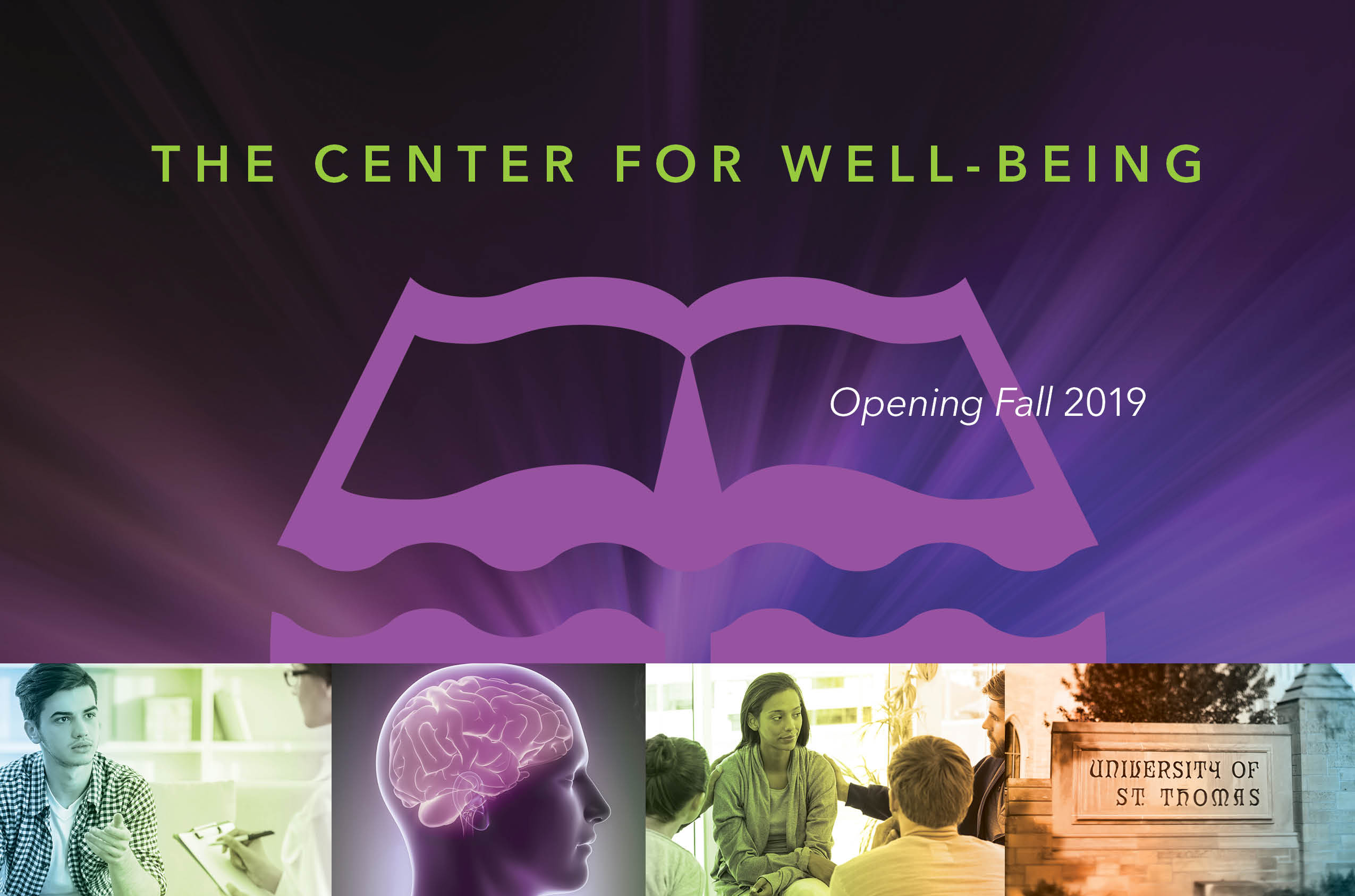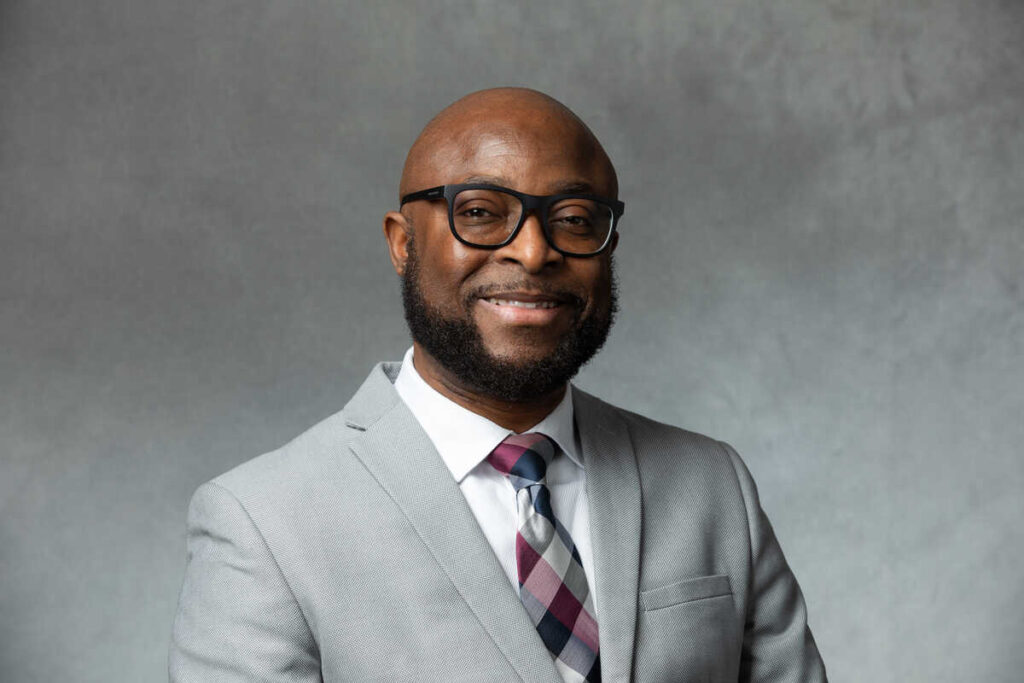“For our students to succeed academically and live happy, productive lives, it is imperative that we proactively care for their health and well-being.” That is the motivation Madonna McDermott said guided our health, counseling and wellness staff during the last year in developing the concept for the Center for Well-Being, which will open in fall 2019 at St. Thomas. “It is a strategic priority for the university that we have a healthy campus,” said McDermott, who serves as executive director for health services.
Nationally, there is a mental health crisis, and St. Thomas is not immune. It’s growing fastest among young people, with more students entering college with a pre-existing mental health issues. As a Newsroom story reported earlier this month, “One in five young adults in the United States lives with a mental illness. According to Mental Health America’s 2018 State of Mental Health in America report, nearly 12 percent of youth (age 12-17) report suffering from at least one major depressive episode in the past year; 63.1 percent of youth with major depression do not receive any mental health treatment.”
To Director of Counseling Steve Maurer, that means many students are coming to college who probably wouldn’t have a generation ago. “Grade school and high school students are being diagnosed and treated earlier, and schools are providing education plans that support students’ progress. Colleges in turn are providing services to better support students with mental health concerns, so more students see college as a realistic opportunity to pursue.”
At St. Thomas, as in the nation, the top three issues are: anxiety, depression, and relationships. At Health Services, McDermott has seen a 400 percent increase in mental health-related appointments over the last two years.
“The increase in demand can be attributed to a combination of influences,” according to a Student Affairs proposal to increase services. They include “increased prevalence of mental illness in adolescents and young adults, high levels of stress (especially financial and academic stress), and increased matriculation of students with mental illness. Mental illness and unmanaged stress are barriers to academic success. Graduate and professional students are also at risk for mental illness.”
The health and well-being of college students plays a critical role in retention, academic progression and graduation. “The University of St. Thomas’ goal is to create an environment where all students are able to achieve their full potential by providing them with the resources, support and education to achieve lifelong health and well-being,” said Dr. Karen Lange, vice president for student affairs.
Getting care on campus
Between health, counseling and wellness, there are over 10,000 points of contact with students. The care and education provided by the Health, Wellness and Counseling Services help students remain in college, graduate on time, avoid missing classes and have a positive long-term impact on our students’ lives. In fact, 65 percent of St. Thomas students who accessed university counseling services said it helped them stay in school, and 67 percent of students said it helped with their academic performance.
The university currently offers counseling and psychological services, located in Murray-Herrick Campus Center, and health services, located in the lower level of Brady Hall. However, the separate locations are a barrier for students in getting from one appointment to the other, and too often coordinated care falls through.
“What seemed like small barriers to the rest of us,” Maurer described, “for a student who is really anxious and avoidant, or a student who is really depressed and has very little energy or motivation, it may have taken all of their energy and motivation to come to that initial appointment.”
“Right now, a nurse practitioner may say [to a student], you need to go over to the counseling center, and they may not take the time to walk over there or know where it is,” Lange observed. “If we had them co-located, we’d be able to say, right next door is a psychologist. Let me introduce you.”
National studies show that only 10 percent of patients follow through on a mental health referral when that service is not located in the same facility as the primary health care provider. “Having services located in the same facility with coordinated care has better outcomes for students,” McDermott said.
An innovative and proactive approach
As a team of St. Thomas health, counseling and wellness providers has been tackling the issue of care and coordination of services, a key theme has emerged: moving toward an upstream approach to well-being. Upstream is a public health concept that acknowledges that while we need to help those who are currently suffering, we must focus on preventing issues from occurring.
According to the 2015 Healthy Minds Study, 53 percent of students met the criteria for flourishing, which was defined as positive mental health. Still, one in two students are not flourishing. It is important to expand existing programs and create new programs and incentives for students to practice self-care through wellness, resiliency and healthy living, taking some of the pressure off the demand for clinical services. At St. Thomas, this would include building a robust resiliency program as well as integrating and strengthening current preventative practices around wellness, violence prevention, and mindfulness and contemplation.
Center for Well-Being to open in fall 2019
With this in mind, St. Thomas is excited to announce the Center for Well-Being that will open in fall 2019. “We are responding in a way that will put the health and wellness of our students front and center while making St. Thomas an innovator in student well-being,” said President Julie Sullivan. The integrated solution will:
REMOVE BARRIERS TO MENTAL HEALTH TREATMENT
- Students will come to the center for all their care, so there will be no distinction between those seeking help for physical and mental health issues.
OFFER COORDINATED CARE
- Providers from our health, counseling and wellness centers will work together on behalf of students to offer a more robust set of prevention, care and intervention services.
- We will integrate mental health, substance abuse and primary care services to produce the best outcomes for students' health and well-being.
- Every student will be treated holistically. That means looking beyond the immediate concern to factors that might be impacting a student’s health such as sleep, nutrition, stress, spirituality, physical activity, violence and substance abuse.
TEACH RESILIENCE AND PROMOTE HEALTHY BEHAVIORS
- We will build a robust resiliency program that integrates and strengthens current practices around wellness, violence prevention, substance abuse, sleep, and mindfulness and contemplation.
Short term, McDermott and Maurer believe integrated health services will result in improved health and increased retention of students. Care provided by health, wellness and counseling providers will result in fewer missed classes, improved retention and on-time graduation. “Long term, the hope is that students will benefit from lasting health,” Lange stated. “We’re caring not only for students today, but also for our future alumni and workforce.”
“We are putting the needs of our students and their mental health as a top priority and shifting our child care focus to one providing better access to more employees,” Dr. Sullivan wrote in her announcement to the St. Thomas community. “I am confident that this is the right decision for our campus community.”







